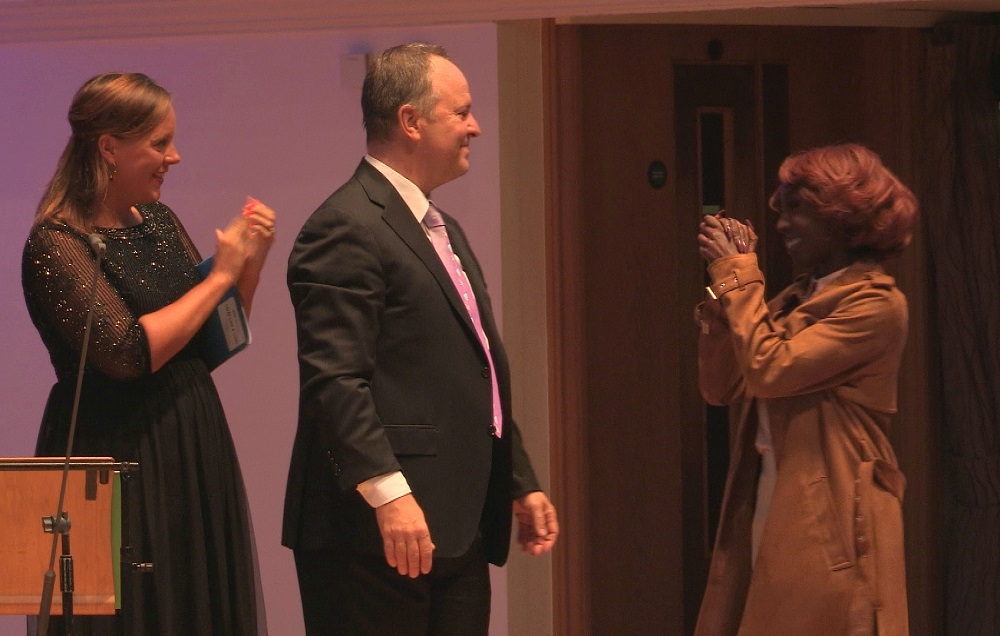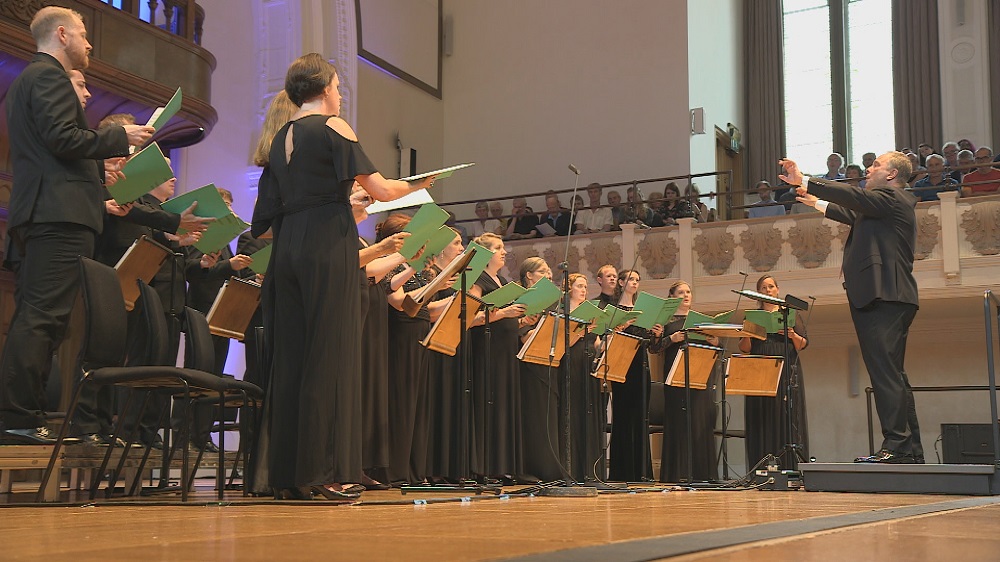Proms at Cadogan Hall 6, BBC Singers, Oramo review - excellent choristers need to diversify | reviews, news & interviews
Proms at...Cadogan Hall 6, BBC Singers, Oramo review - excellent choristers need to diversify
Proms at...Cadogan Hall 6, BBC Singers, Oramo review - excellent choristers need to diversify
Too monochrome for Laura Mvula, but Parry dazzles in the hands of a great conductor

Those of us schooled in the English choral tradition know and love Hubert Parry's "My soul, there is a country", but few have sung or heard it live as the first of a mighty cycle. Parry completed the six Songs of Farewell not long before his death 100 years ago.
Oramo also had an unexpected connection to the sixth of the women composers commissioned by the BBC in these superb Cadogan Hall lunchtime Proms. Laura Mvula was 12 when she played the violin in the CBSO Youth Orchestra under Oramo. His seemingly sincere words about her new work, Love Like a Lion, were justified by the premiere: the gift to be simple in the two winged outer numbers, a more complex departure from the basis of a spiritual in the most individual setting, "I will not die (for him)". The (uncredited) soprano solo had the ideal stratospheric ease here, but the visuals as well as a certain type of British choral reserve gave us a big question mark: can the BBC Singers really not have a single chorister of BAME origin? Quite apart from anything else, it would probably make a difference to the rather monochrome as well as monocultural essence. Time to move on.  At least it was good that the Proms spotlighted Mvula the composer (pictured above with Oramo and a member of trhe BBC Singers - both performance images © BBC Studios), as well as Ben Okri, her chosen writer, an African in a distinguished line of poets ranging back to Donne, Shelley and Christina Rossetti. Frank Bridge's Music, when soft voices die was a gem to start the programme, even if it set the mood for what should have been a late-night meditation rather than a lunchtime spectacular. Double choir enriched Holst's very individual Nunc dimittis, unpublished until 1979, a setting with one of the most winsome "Glorias" in the cathedral repertoire.
At least it was good that the Proms spotlighted Mvula the composer (pictured above with Oramo and a member of trhe BBC Singers - both performance images © BBC Studios), as well as Ben Okri, her chosen writer, an African in a distinguished line of poets ranging back to Donne, Shelley and Christina Rossetti. Frank Bridge's Music, when soft voices die was a gem to start the programme, even if it set the mood for what should have been a late-night meditation rather than a lunchtime spectacular. Double choir enriched Holst's very individual Nunc dimittis, unpublished until 1979, a setting with one of the most winsome "Glorias" in the cathedral repertoire.
Parry steadily opens up across the Songs of Farewell from four to seven parts, but each setting is perfect in its way because of the way the poetic sense is so beautifully underlined. In the second verse of John Davies's "I know my soul hath power to know all things", the ear is held rapt by the contrast between "wretched" man "mocked" in everything and the pride that survives all that.  Most moving, for me, is the unique response to Lockhart's "There is an old belief". The sentiment is tear-jerking in itself: the mortal must hold to the stated creed that "Beyond the sphere of grief/ Dear friends shall meet once more" – the plainsong Credo unexpectedly surfaces in this intimate setting – and to hope, but cautions "Eternal be the sleep, if not to waken so". Parry's repetitions of the words and his startling chords show total, deeply-felt mastery. Wonderful, too, the way the last two numbers descend from the myriad glories which launch the Donne setting – again, great setting of "you numberless infinities" – to the slow fade at the end of Parry's chosen lines from Psalm 39. With Oramo shaping lovingly but never ostentatiously, the sense was always clear, strands of individual voices allowed to tell among the richness from time to time. Masterly.
Most moving, for me, is the unique response to Lockhart's "There is an old belief". The sentiment is tear-jerking in itself: the mortal must hold to the stated creed that "Beyond the sphere of grief/ Dear friends shall meet once more" – the plainsong Credo unexpectedly surfaces in this intimate setting – and to hope, but cautions "Eternal be the sleep, if not to waken so". Parry's repetitions of the words and his startling chords show total, deeply-felt mastery. Wonderful, too, the way the last two numbers descend from the myriad glories which launch the Donne setting – again, great setting of "you numberless infinities" – to the slow fade at the end of Parry's chosen lines from Psalm 39. With Oramo shaping lovingly but never ostentatiously, the sense was always clear, strands of individual voices allowed to tell among the richness from time to time. Masterly.
rating
Explore topics
Share this article
The future of Arts Journalism
You can stop theartsdesk.com closing!
We urgently need financing to survive. Our fundraising drive has thus far raised £49,000 but we need to reach £100,000 or we will be forced to close. Please contribute here: https://gofund.me/c3f6033d
And if you can forward this information to anyone who might assist, we’d be grateful.

Subscribe to theartsdesk.com
Thank you for continuing to read our work on theartsdesk.com. For unlimited access to every article in its entirety, including our archive of more than 15,000 pieces, we're asking for £5 per month or £40 per year. We feel it's a very good deal, and hope you do too.
To take a subscription now simply click here.
And if you're looking for that extra gift for a friend or family member, why not treat them to a theartsdesk.com gift subscription?
more Classical music
 First Person: Manchester Camerata's Head of Artistic Planning Clara Marshall Cawley on questioning the status quo
Five days of free events with all sorts of audiences around Manchester starts tomorrow
First Person: Manchester Camerata's Head of Artistic Planning Clara Marshall Cawley on questioning the status quo
Five days of free events with all sorts of audiences around Manchester starts tomorrow
 Goldscheider, Brother Tree Sound, Kings Place review - music of hope from a young composer
Unusual combination of horn, strings and electronics makes for some intriguing listening
Goldscheider, Brother Tree Sound, Kings Place review - music of hope from a young composer
Unusual combination of horn, strings and electronics makes for some intriguing listening
 theartsdesk Q&A: composer Donghoon Shin on his new concerto for pianist Seong-Jin Cho
Classical music makes its debut at London's K-Music Festival
theartsdesk Q&A: composer Donghoon Shin on his new concerto for pianist Seong-Jin Cho
Classical music makes its debut at London's K-Music Festival
 Helleur-Simcock, Hallé, Wong, Bridgewater Hall, Manchester review - moving lyricism in Elgar’s concerto
Season opener brings lyrical beauty, crisp confidence and a proper Romantic wallow
Helleur-Simcock, Hallé, Wong, Bridgewater Hall, Manchester review - moving lyricism in Elgar’s concerto
Season opener brings lyrical beauty, crisp confidence and a proper Romantic wallow
 Kohout, Spence, Braun, Manchester Camerata, Huth, RNCM, Manchester review - joy, insight, imagination and unanimity
Celebration of the past with stars of the future at the Royal Northern College
Kohout, Spence, Braun, Manchester Camerata, Huth, RNCM, Manchester review - joy, insight, imagination and unanimity
Celebration of the past with stars of the future at the Royal Northern College
 Jansen, LSO, Pappano, Barbican review - profound and bracing emotional workouts
Great soloist, conductor and orchestra take Britten and Shostakovich to the edge
Jansen, LSO, Pappano, Barbican review - profound and bracing emotional workouts
Great soloist, conductor and orchestra take Britten and Shostakovich to the edge
 Jakub Hrůša and Friends in Concert, Royal Opera review - fleshcreep in two uneven halves
Bartók kept short, and a sprawling Dvořák choral ballad done as well as it could be
Jakub Hrůša and Friends in Concert, Royal Opera review - fleshcreep in two uneven halves
Bartók kept short, and a sprawling Dvořák choral ballad done as well as it could be
 Hadelich, BBC Philharmonic, Storgårds, Bridgewater Hall, Manchester review - youth, fate and pain
Prokofiev in the hands of a fine violinist has surely never sounded better
Hadelich, BBC Philharmonic, Storgårds, Bridgewater Hall, Manchester review - youth, fate and pain
Prokofiev in the hands of a fine violinist has surely never sounded better
 Monteverdi Choir, ORR, Heras-Casado, St Martin-in-the-Fields review - flames of joy and sorrow
First-rate soloists, choir and orchestra unite in a blazing Mozart Requiem
Monteverdi Choir, ORR, Heras-Casado, St Martin-in-the-Fields review - flames of joy and sorrow
First-rate soloists, choir and orchestra unite in a blazing Mozart Requiem
 Cho, LSO, Pappano, Barbican review - finely-focused stormy weather
Chameleonic Seong-Jin Cho is a match for the fine-tuning of the LSO’s Chief Conductor
Cho, LSO, Pappano, Barbican review - finely-focused stormy weather
Chameleonic Seong-Jin Cho is a match for the fine-tuning of the LSO’s Chief Conductor
 Classical CDs: Shrouds, silhouettes and superstition
Cello concertos, choral collections and a stunning tribute to a contemporary giant
Classical CDs: Shrouds, silhouettes and superstition
Cello concertos, choral collections and a stunning tribute to a contemporary giant
 Appl, Levickis, Wigmore Hall review - fun to the fore in cabaret and show songs
A relaxed evening of light-hearted fare, with the accordion offering unusual colours
Appl, Levickis, Wigmore Hall review - fun to the fore in cabaret and show songs
A relaxed evening of light-hearted fare, with the accordion offering unusual colours

Add comment